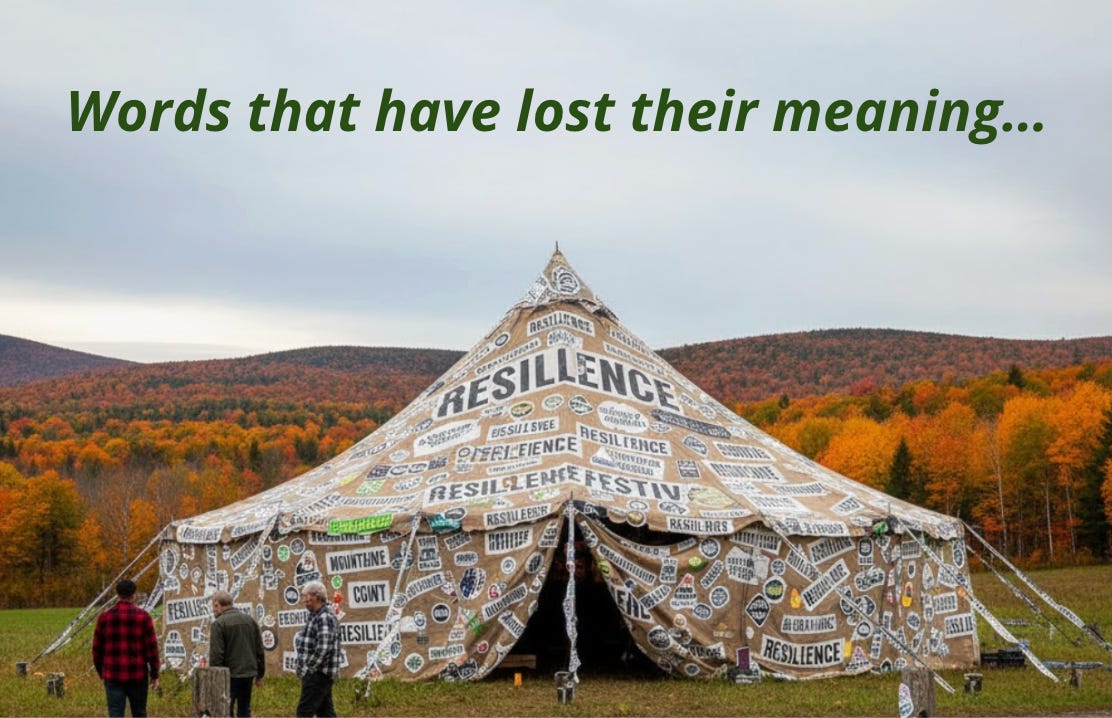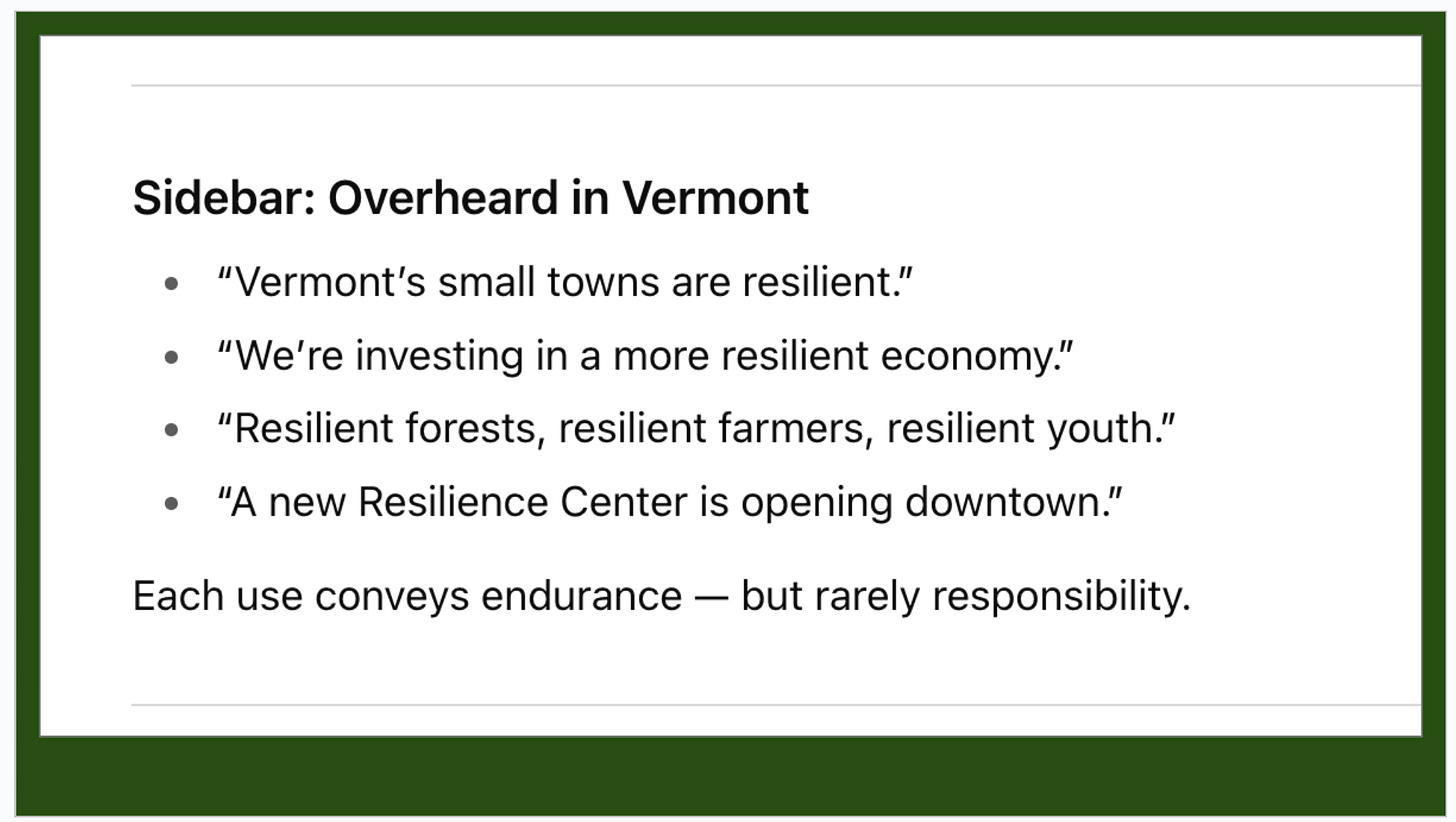In Vermont, 'Resilience' has become the polite synonym for “you’re on your own, but we admire your spirit.”
In "Words That Have Lost Their Meaning," Compass Vermont looks at the language that has become so ubiquitous it risks saying nothing at all.
Every era has its buzzwords — those once-sharp terms that, through repetition and overuse, grow dull around the edges. Once a word reserved for rare, admirable endurance — the ability to recover from disaster, trauma, or hardship — resilience has ballooned into a catch-all for everything from toddlers learning patience to corporations surviving bad press.
It’s invoked in graduation speeches, selectboard meetings, disaster recovery plans, and marketing campaigns alike. Its ubiquity has made it both comforting and hollow — a kind of moral currency whose value has been inflated through overuse.
The Original Meaning
According to Merriam-Webster, resilience is “the capacity to recover quickly from difficulties; toughness.” The Latin root resilire means “to spring back.”
Originally, it described the physics of elasticity — how a material could return to its shape after stress. The word migrated to psychology and then into broader public life, where it became shorthand for personal strength.
But when a word expands too far, it loses focus. Recovery from what? At what cost? And who provides the support that makes “bouncing back” possible?
When “Resilience” Becomes an Expectation
Over the past two decades, resilience has been institutionalized. Schools promote “resilience curricula.” Workplaces offer “resilience training.” Government agencies issue “resilience frameworks” to prepare for climate disasters.
The word’s rise mirrors a social shift: responsibility moving from systems to individuals. Instead of asking why crises keep happening — from flooding to housing shortages — we are told to become more resilient in response.
Sociologist Brad Evans calls this the “tyranny of resilience”: the quiet moral demand to endure rather than challenge the conditions causing the hardship.
The Vermont Overuse: A Word for Every Crisis
Few states use resilience more liberally than Vermont. The word shows up in grant proposals, planning documents, and press releases across nearly every sector:
Flood recovery: After the July 2023 and 2024 floods, “community resilience” appeared in nearly every funding announcement. The term often stood in for long-term adaptation or infrastructure planning — sometimes as a placeholder for work that hadn’t yet been funded.
Energy policy: The state’s “resilient energy future” and “grid resilience grants” frame modernization efforts as moral necessities, even when the term is used interchangeably with “reliable.”
Economic development: “Rural resilience” now describes everything from broadband access to childcare funding. The word has become a reflex — a way to suggest progress without naming the problem directly.
Mental health: State and local campaigns often urge residents to “build personal resilience” in the face of trauma, poverty, or housing insecurity — as though stoicism were a substitute for systemic support.
In Vermont, resilience has become the polite synonym for “you’re on your own, but we admire your spirit.”
When Governments and Corporations Adopt It
Across the country — and across Vermont — the word resilience appears wherever something has gone wrong. Cities draft “resilience plans.” Corporations tout “resilient supply chains.” Even banks issue “resilience reports” after layoffs or scandals.
It’s not that the word is wrong; it’s that it’s used to fill the silence where specifics should be. A resilient community could mean one that built better culverts — or one that simply endured another round of flood damage without complaint.
The word’s flexibility makes it irresistible — and therefore, meaningless.
The Emotional Cost of Constant Resilience
Psychologists warn that a culture obsessed with resilience risks glorifying exhaustion. When people are praised for “bouncing back,” the message can be: don’t stop, don’t rest, don’t protest.
True resilience requires rest, resources, and support — not just attitude. It’s not the absence of struggle; it’s recovery made possible by community, policy, and compassion.
Reclaiming the Word
Maybe resilience doesn’t need to be discarded, just reclaimed.
It should once again mean something specific: the strength that grows because support systems work, not despite their failure.
A resilient Vermont isn’t one that keeps mopping up after the next storm — it’s one that builds a future where fewer homes flood in the first place. A resilient person isn’t one who accepts neglect with grace, but one who insists on dignity and care.
Closing Thought
Resilience once evoked strength. Today, it too often masks exhaustion.
If the word is to mean something again, it must be tethered to reality — to the cause of the stress and the collective action that eases it.
Otherwise, it’s just a pat on the back offered by those standing on dry ground.




